If you are looking for a shopping cart software, chances are you have heard about Shopify. Shopify is an online selling platform.
Using this platform you can easily create and develop an e-store. Through which you can easily promote, sell and ship products.
Today, Shopify is one of the most popular platforms. This journey started over 10 years back when a group of people were looking for an effective way to sell and deliver snowboarding equipment.
Very soon the team realized that the online market space doesn’t offer a personalized shopping experience.
As a result, they decided to create their own e-commerce platform to sell their snowboarding products. Thus, Shopify was born which now hosts more than 3,77,000 active online stores that generate $29 billion of sales.
Today, this e-commerce website builder allows the merchant to design, build, market and sell products to consumers across the globe. It’s one of the leading commerce platform designed for businesses of any domain or size.
Since then Shopify has been on a mission to make online business better and smooth for everyone since.
So what is Shopify? Shopify is an eCommerce platform. The good part is you can easily skip the cost of hosting and the technicalities with Shopify.
No wonder why businesses find Shopify an easy platform to use. It’s a cloud-based SaaS solution.
By paying a low monthly fee you can get easily enter the store data, add products and process orders.
With Shopify, you can run a complete online store for as low as $29 per month. Clearly, Shopify looks to be an excellent platform for many online merchants. But hey what’s future looks like with Shopify?
Data revealed that this e-commerce platform has grown 144% in 2019 for small retailers.
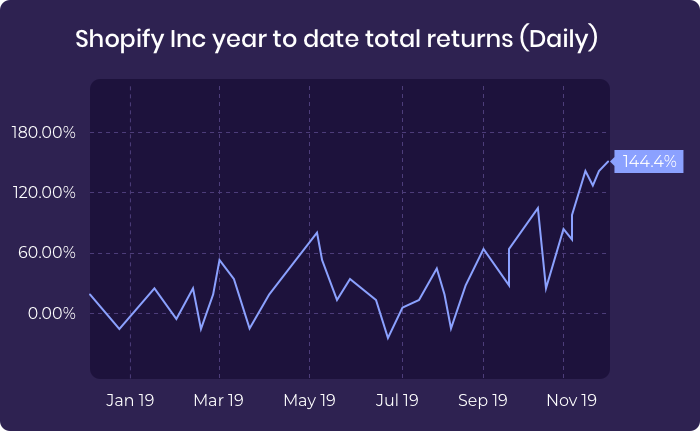
So, the question comes will Shopify keep defining the future of e-commerce for small retailers?
However, the company investor presentation suggests that the platform is not just limited to small online operations.
Instead, Shopify has exposure across all segments of the market.
The research revealed that a brand new retailer starts the online sales on Shopify’s platform after every 52 seconds. Some of the big brands include All bird, Clarks Shoes, Sony and many more.
So if you are someone who just has a weekend or a few hours to start, this is the platform to go for.
Shopify is an all-inclusive online platform where you can sell, promote and ship your products.
The other platform that is very popular for an e-commerce store is Magento (more particularly, Magento Commerce).
According to Salmon, (Wunderman commerce company), Magento accounts for 31.4% of top 100,000 e-commerce stores.
So exactly what is Magento?
Magento is an eCommerce platform. It’s an open-source built-in PHP which allows a developer to build e-commerce websites.
The platform was released on 31st March 2008. Thousands of businesses across the globe have used this open-source platform to build online stores. This includes many big names like Nike, Samsung, and many more.
A study revealed that Magento is one of the world’s leading solutions. Accounting for 26% of the best e-commerce websites using Magento. This is a powerful platform comes with highly flexible features.
It includes intuitive admin panel, SEO friendly and extraordinary features like high scalability.
Being a highly scalable platform, it handles any size of e-commerce store regardless of its size. So if this platform is drawing your attention, few things need to be cleared. An enterprise needs to understand the difference between Magento open-source and Magento Commerce.
Magento Open source: It’s also known as Magento Community. Magento Open Source is a free version of Magento. This means you can download, customize and self-host your e-store using Magento.
Magento Commerce: Magento commerce is a premium version of Magento open source. This comes in two versions known as Magento Enterprise and Magento Enterprise cloud.
Then you can host it on your own on a server. This one is a bit limited due to the free option. Undoubtedly Magento provides more features into their paid product.
Magento Commerce can be purchased either as their standard offering as Magento commerce or as Magento Commerce cloud. Its hosted by Magento on their AWS stack.
Magento open source can be used by everyone free of charge. Also, you can extend and configure the platform if and when needed.
Magento open source is quite popular because its users get access to a vast range of themes and extensions that are supported by a growing community.
The premium version prices start from $22,000 annually. It’s important to note that this fee increases if your company’s Gross Merchandise Value is higher than 1 million dollars.
It comes with advanced functionality, features, customer reward programs and many other things. What’s more? You get 24/7 technical support from Magento’s team. More on Magento features below. But first, see what the numbers indicate.
Magento and Shopify are two very popular e-commerce platforms across the globe. But which is more popular over the other? To understand this part, let's see what the number have the say.
We are using Builtwith data, let’s what the statistics show:
Active Online stores: Magento Vs Shopify
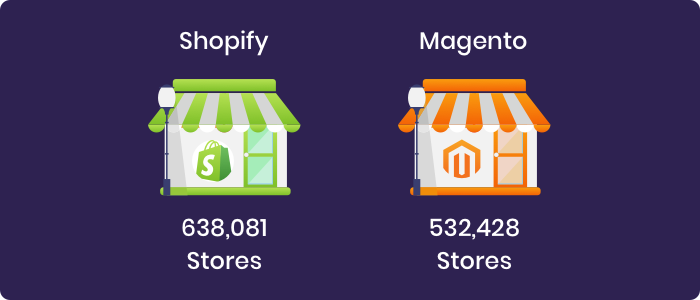
How does Shopify perform under Hosted solution category? Here’s data:

Shopify online stores vast majority are active in the US.
Apart from the US, Shopify online stores are also in the UK, Canada and Australia.
Shopify is used by many small and big sized businesses.
However, many big giants have also used this platform. The list includes the names like Tesla, Los Angeles lakers store etc.
How popular Magento is Under the e-commerce category?

Most Magento stores are operating in the US region. However, it's also used in the UK, Netherlands and Germany.
What’s Magento Market share among the top sites?

Magento is regarded as the world’s biggest e-commerce platform.
But Is Magento better than Shopify?
Well, the answer is not very straightforward. As it depends on the business requirements. For instance, we have seen Shopify have a much bigger share in the mid-level market.
Although when compared to Shopify, Magento is found to be the most commonly used e-commerce platform.
As per the Google trends: Magento also has an overall search interest than Shopify.
Starting a new online e-commerce business is a difficult task. Isn’t it? Surely you don’t want to make the process stressful or difficult.
Right? So it’s important to choose a platform that’s easy to use and delivers a high user experience.
High user experience influences the user engagement positively and eventually sales. So it’s important to choose a platform that you are 100% comfortable and happily using.
When it comes to ease of use, Shopify is often claimed to win the race. Why so? This platform is designed with an intuitive interface to use, making it easy for a non-technical user. What’s more?
Shopify is a drag and drop, website builder. This means the user can easily customize the entire store by simply moving the elements as desired. How? Well, the platform gives you all the tools to build and customize your store in no time.
In my experience, none of the shopify store scored less than 4 out of 4 when it comes “ease of use”. In fact, close to 88% of them had recommend it others. Reason being you can easily customize the entire store without touching a line of code.
Shopify e-commerce platform allows you to:
Easily personalize your store by adding custom images to your theme
Add product/services easily and start selling quickly
Set easy payment methods
Customize the store and make it memorable for your customers.
What’s more is the shopify’s customer support service. So just in case you get stuck somewhere, shopify has 24/7 customer service active on phone, Live chat and on emails.
We have seen how shopify makes it easier to build and launch your store. But what about magento?
Magento comes with ready made extensions making it easier for user to work. However, users do face some issues who don’t have technical background. A lot of these issues have been addressed with Magento 2.
This new version tackle many issues users had with the first versions. Magento 2 is designed with a user friendly admin panel.
New users can easily learn this platform. Being a user friendly admin panel it’s easier for the admin to complete many tasks.
This includes: accessing advanced report, managing payment processors, sort customers, product, services, etc.
Magento’s user friendly admin panel makes it easier for new businesses who are struggling to complete lengthy to-do lists in a shorter amount of time
However, you need to bring a development team on board to utilize the full potential of this platform.
A professional magento ecommerce development company knows how to deliver superior quality magento websites.
Magento is a popular platform known for its high scalability and versatility to fuel the business growth.
Good website design makes it easier for users to build trust. No wonder why the theme of your online store is very important.
Designing is a very crucial part of any online store. The goal is to create a unique brand through design that users can easily recognize, trust and respect.
No wonder, both Magento and Shopify offer various premium and free themes. Also, most of the themes are responsive
The theme of your online store is important from a user point of view. An online store that looks professional and sleek makes a good impression and inspire trust.
Result? Customers will more likely to buy stuff from a trusted platform. Thus, leading to a loyal customer base.
So you need to wisely choose the theme that makes your brand more trustworthy. Let’s see how Shopify and Magento work when it comes to offering themes.
When it comes to themes, Shopify offers a big range of around 60 professional, attractive and themes.
However, this platform doesn’t allow for a lot of customization as most of the themes are proprietary.
Beyond editing font and colours, you can’t tweak it further. So users aren’t able to customize themes. This might be an issue while designing for store branding.

In Magento, you will get around 12 themes in which 10 are fully mobile responsive. It means the site will be auto-sized for all sizes of devices. What if you need something unique? Well, then you can get created. All you need is a team of developers. A professional developer has the knowledge to code your theme from scratch. Magento is best for those who want to leave an impression. The platform is extremely flexible and can customize pretty much everything as per your ideas.
So what all can get customized with Magento? Here’s a brief list:
Customized featured product slider
Make it visually engaging through animations
Integrate newsletter feature in the site footer
Add cross-selling blocks
That’s not it, the latest upgrade of this platform includes drag and drop visual editing. So whether you have coding knowledge or not, creating beautiful sites is an easy task
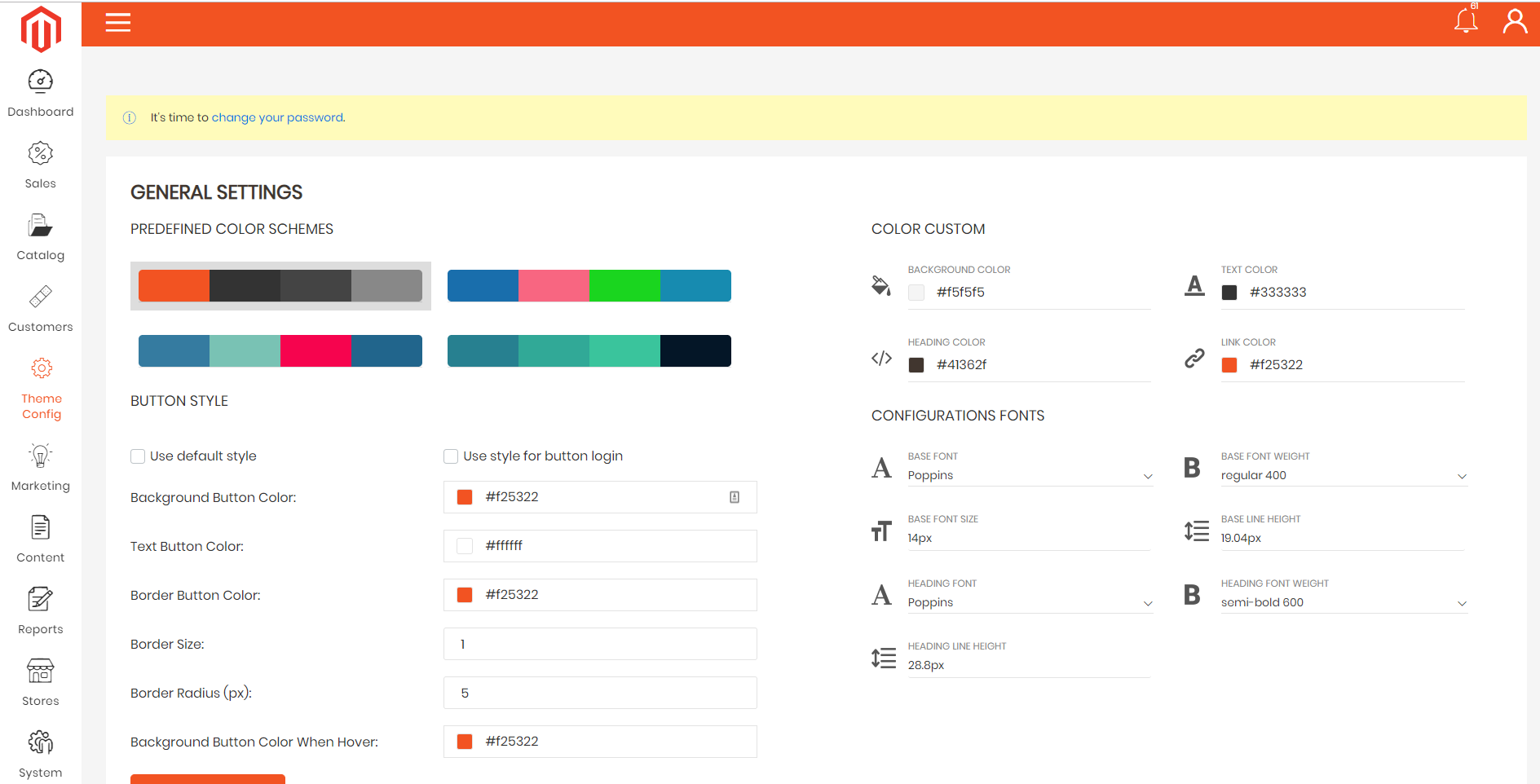

Why is SEO so important for any ecommerce?
Well, data suggests that 93% of the internet activity begins with a search.
What does this mean for an online store?
Simple, you would have a difficult time running an ecommerce store if your potential audience can’t search for your website online.
No wonder most ecommerce platforms now offer SEO friendly features to help you optimize your site and drive higher ROI.
These factors include: UX, speed, meta tags, etc. Lets see in magento vs shopify which platform offers more SEO friendly elements
Magento offers flexibility from an SEO standpoint as the system is more open
When compared to shopify, magento found to be more powerful. So what makes Magento so powerful?
Here some best SEO features available for magento store
Content optimization through ReloadSEO
Powerful URL customization
Magento offers variety of SEO extensions based on the requirement
SEO suite
Layered navigation SEO
Advance Site map
SEO rich Snippets
MSemantic SEO for rich snippets
Allow programmatic seo changes
Fine-tune Permalinks for inventory items.
So magento platform can help you execute custom SEO and digital marketing strategies easily.
You can quickly customize & tweak SEO strategy and store design to increase ROI. Being an open source platform it is extremely seo friendly.
All the magento features ensure search engines easily index ecommerce websites and understand the structure.
These are just a few of them the list is longer.
Plugins available to optimize SEO
SEO image optimizer
Ultra SEO
SEO Meta manager
An active community and support for SEO
Shopify stores perform better for beginners
Apart from these features shopify offers few basic set of seo options.
For instance: editing meta tags, optimize inventory, product pages etc. Moreover, the platform also allows for in depth optimization.
As a result the platform can modify the file structure. However, there are few limitations too. The most prominent is that shopify platforms are self hosted.
So you can’t edit or change server-level configurations.
Your ecommerce store shouldn’t just look great but also works greatly. For this the website need to have efficient functionality.
Both the platforms offer extensions and multiple functionalist to your app. So let's see which platform make your website more powerful with their add-on features
Shopify offer a small list of add on features which can directly be get from their official site.
These extensions come with a quick and easy installation process.
Shopify offers around 2500+ free and paid apps to add functionalities, manage the online store and boost ROI. It's important to know that some of the apps in shopify require coding snippets.
These features comes with many advantages. Here are some of these:
Display trust icons on your website to your targeted audience. This will reduce cart abandonment rate and increase sales.
The platform allow you to easily integrate marketing email campaigns such as mail chimp to contact your potential visitors
Integrate your shopify 10 social media feeds. This helps store to connect with their targeted leads and boost brand awareness
Add the order tracking plugin so that the users can track the status of your order. For instance: opt for $4/month. This feature automatically notified the customers about their order whereabouts.
You can check your store success rate by using analytics buddy extension. This way you can instantly know when your customers are abondming the payment stage.
Magento offers more than 5300+ variety of extensions. This can be integrated without any advanced coding knowledge.
Given the high number of extensions on this platform, the choice of adding complex features is immense.
Here are some of the features:
Use plugins like “Product pre-order” to notify the potential customers about the new product. Quickly send an email whenever a new product is released on your store.
Magento allows you to integrate marketing email campaigns and send social feeds to promote your products and services. For
You can promote specific products of your sale by offering them custom discount options. For example:- Amasty Multiple Coupons.
Magento offers the advantage of Integrating marketing email campaigns and sending social feeds to promote your products. For example- Remarkety.
You can also create advertising banners using Banner Slider.’
So to support the ecommerce store with multiple functionalities, both platforms offer extensions and an app store.
On comparison, shopify found to have a small collection of apps. Magento on the other hand has an advantage with over 5000 + extensions. These comes with a mix of free and paid extensions.
You can easily extend the functionality of the platform without worrying about the coding part. So regarding the add ons part, Magento is clearly a winner.
Hosting, is another major difference that distinguish these two platforms from each other.
So it's important to do proper research before choosing the platform to power your store. So when it comes to hosting, most of the ecommerce platforms fall into two categories: hosted and self hosted software.
You can check your store success rate by With a hosted solution you don’t need to set up the software or procure a server. However, with self hosted platforms these concerns do surface. Hosted and self hosted platforms functions in different ways.
Most of the hosted ecommerce website builders doesn’t give your the entire control. However in the case of shopify there are some exceptions. For instance shopify does allow you to write in CSS and HTML.
But for changes in core programing you either wouldn’t get any access or would need the help of developers. However, there are many good things too. The are designed to support the needs of online retailers.
So be it built in concentrated features, integrations to customer support, security and many other services are covered by the platform.
However, with self hosted platform things are different. Hosting price, domain registration and security all are separate.
It's good to consider the cost of all these factors before you choose the platform.
It's a hosted ecommerce platform. You can create a modern online store with this platform quickly.
Shopify is completely cloud based and hosting comes with the subscription. Result? You don’t have to spend time on finding hosting and deal with the challenges of managing it.
Once you choose shopify, hosting is included with your subscription.
On the other hand, Magento is a self hosted ecommerce platform that comes with its wide set of features. If you are planning to use magento, the process will be a bit more involved.
With magento, your first step will be to find adequate hosting.
Magento works better with good hosting plan. Not having the best hosting can slow down the backend.
You wouldn’t be able to keep up with the orders. So it's important to choose the right hosting plan. Don’t opt for the cheapest plan. Check the bandwidth, acceptable usage limit, knowledge base, terms and conditions and other extra optimization package.
All these factors will determine how long your site will be up especially if your store is receiving a good sizeable amount of traffic. Apart from this you need to hire a good team of magento developers.
Inadequate payment processing solutions can hamper your sales! So it's essential that your consumers get an opportunity to purchase items with just a few clicks.
Payment processors are services that allow you to take online credit card payments from your customers.
In order to speed up the payment process, the store needs to have an easy version of payment processors. Lets see which platform offers better payment processors.
Shopify comes with their own payment processor “shopify payments”. This feature allows you to manage the payments quickly in the user dashboard.
Not many know but shopify was the first platform in the market that introduced their own payment processor. The platform works to deliver the most useful and most up to date features to the customers.
The platform supports over 100 external payment processors. The big list includes PayPal, AmazonPay etc. It allows the customers to use different payment methods that makes it user friendly.
Result? The users are happy and their chances of returning to the platform is very high.
What’s the best part? With shopify payments you can easily wave the transaction fees and make more sales. It’s indeed a good feature.
The platform also helps you to track money in real-time. This feature helps the store owner to manage everything easily as everything can be monitored from the same place.
Result? The sales process gets quick and easy. You can easily leverage this benefit by hiring a professional shopify ecommerce team who knows who to design an e-store based on your needs and target audience.
Shopify payments: The platform is designed with their own payment processor. You can skip any additional transaction fees with shopify payments
Abandoned checkout recovery: it sends an automatic email to users who abandon the car before the checkout process.
Third party payment gateway: shopify supports most of the third party payment gateways. This includes stripe, paypal, braintree, adyen, paypal, worldpay. However, this comes with an additional processing fee
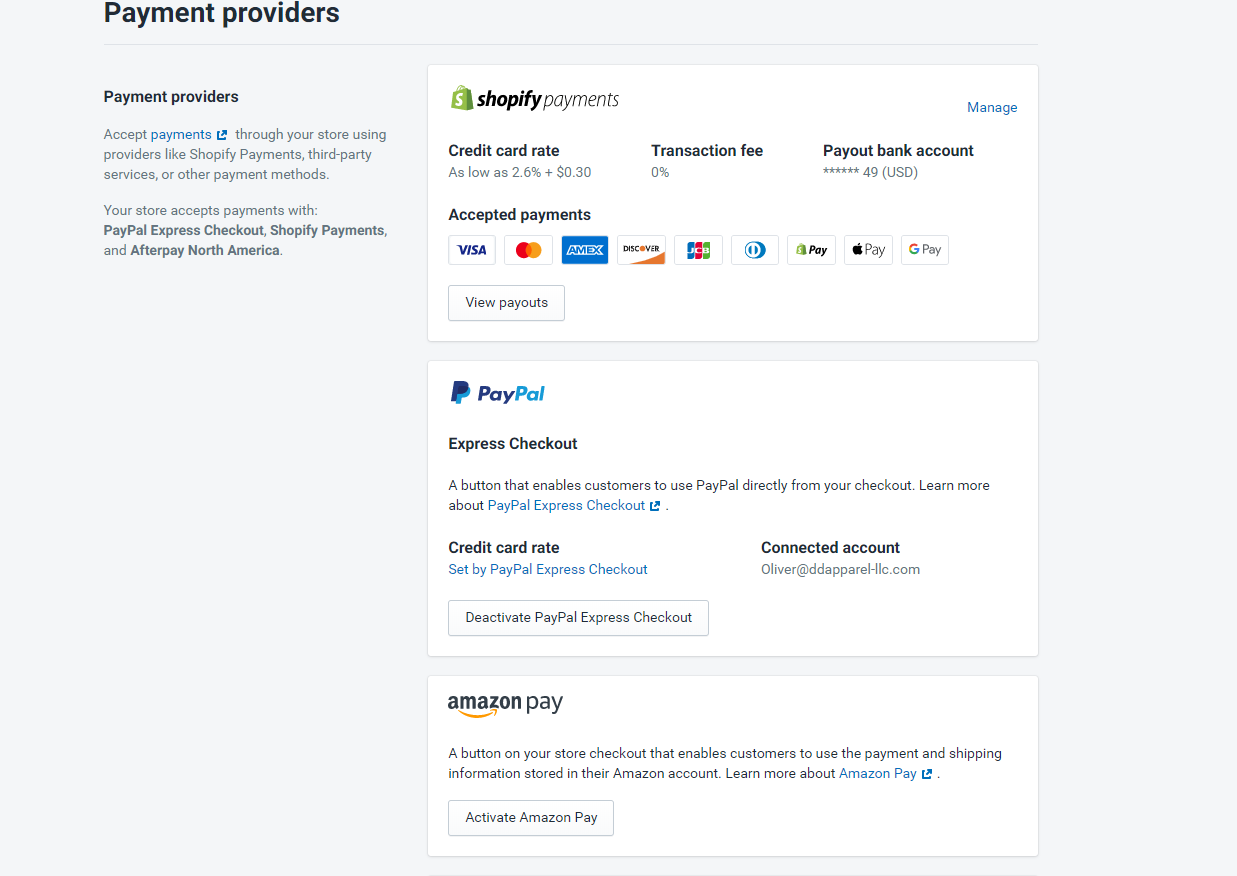
Magento payment processor is slightly different than shopify. To access magento payment processor options, you have to go via the market place.
Unlike shopify, magento payment processor is slightly more drawn out. However, it's not difficult to follow.
Magento supports many major payment processors. The list includes Paypal, AmazonPay and stripe. You can find around 148 payment integration apps of magento in the marketplace.
However, all this often appears to be a bit of pain. So if you are looking for a platform that is simple and more straightforward, go with shopify.
However, magento comes with many of its features. This platform offers a wide range of payment processors which support different languages and countries.
So if you want to spread your store across the globe this option is perfect. Magento gives you option to get connected with customers who communicate in other than english language.
This is an important feature that can give a boost to your online store. Not many people know but around 42% of consumers never make purchases in their non native languages.
So if you want to make your store accessible for international customers, then you need to integrate with multi-language support. That’s where Magento wins the race.
However, shopify do offer few translation apps to make your store for international audience. But when compared with magento, shopify’s capacity is not as comprehensive.
Key features of magento payment processor
Quick Checkout: Magento is designed with instant checkout feature. This allows the users to quickly and easily checkout the page.
Advanced site management: The platform offers advanced site management options. This means the client can control multiple websites and stores from one admin. Not just this, but you can create, preview and even schedule content updates
So which platform should you choose between: magento vs shopify? Well, the answer depends on your needs.
If you are looking for a platform that offers easy and quick payment processors, then shopify is the right fit. Also, you can skip the waiving transaction fees if using shopify payments.
Where as magento wins if you want to take your store to across borders. The platform is designed with multilingual payment processors to take your store across borders.
With magento your store can support multiple currencies, languages and the respective tax rates.
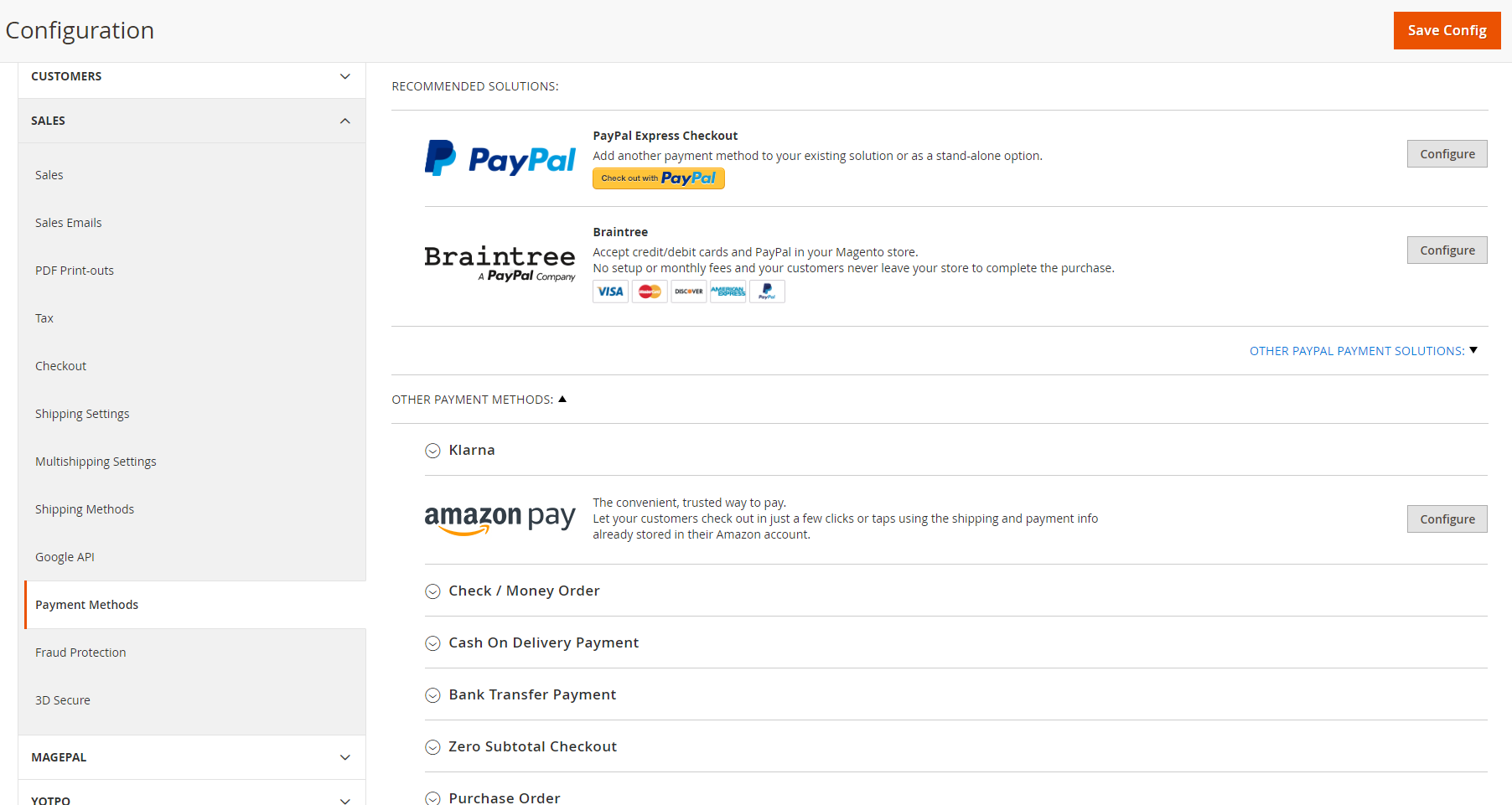
How much does Shopify cost? The price vary as per the plan. So its important to break it down this aspect properly. Shopify is billed on a monthly basis. The monthly billing comes with a couple of additional costs that needs to be kept in mind.
So what all comes in this additional list? There are many things.
For instance: paid themes. Shopify offers a wide range of free themes. But what if you want to extend your choice beyond free themes?
Then comes the paid themes. We have seen the importance of themes. It’s huge it can massively determine the shopping experience of the customers.
A right, user engaging theme can in fact push them below in the sales funnel. Not just that, it also gives a professional look to website. Result? It makes the platform more trustworthy and boost the revenue.
Shopify paid theme prices vary from 140$ to 180. One should consider this cost before choosing the platform.
Another cost that one should keep is mind is of domain name. The domain name is the digital address of your store.
Your user will reach on your store through this address. Indeed, it's very important. Your domain name should look professional, and trustworthy.
With shopify you will receive a free domain name in your monthly package. However, this comes with a disadvantage.
Shopify domain name contains brand name within it. For instance: your online store will look like: "www.storeforall.myshopify.com"
Looking less professional? Yes, that happens. So we recommend our clients to purchase their own domain name.
Choosing a domain through shopify is quick and easy process. But it's important to look at long term flexibility.
For instance what if you want to change the platform in the future. In that case a domain name that includes shopify in it would be a difficult task.
To ensure more flexibility in the long run you can purchase the domain name through GoDaddy or NameCheap.
A custom domain name comes with a cost of around $10 to 15. This can be renewed annually.
Next comes the monthly costs. Shopify comes with a 14 day free trial. So you can try it out before selecting to a monthly plan.
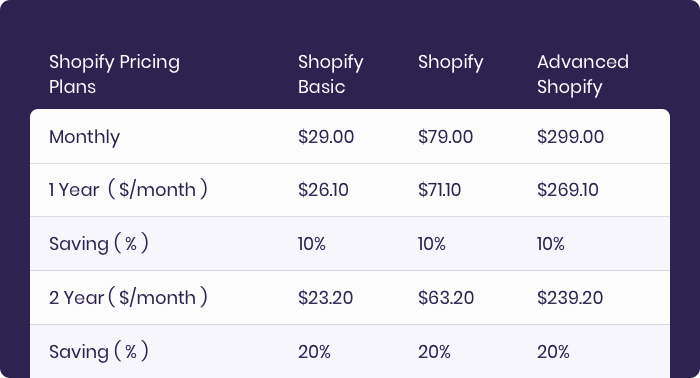
Support service: Customer support 24/7
Security: Shopify gives you SSL certificate this shows the user that the website is safe to use.
Fraud analysis: You can ensure that your online store is safe from hacking practices.
Storage: The platform comes with unlimited storage. As a result it is perfect for hosting photos and videos on your site.
Storage: The platform comes with unlimited storage. As a result it is perfect for hosting photos and videos on your site.
It also implies that the store will work smoothly and quickly. Result? The user will stay on your page for a longer time. A platform that loads quickly will not get hanged easily.
Users love the site that works quickly. The more users stay on your site, the more sales you will likely make.
Now lets what other factors include in the monthly plan list:

Magento upfront costs are calculated in a similar way. By analysing the cost of your theme and the domain name.
But as magento is a self hosted platform, the first step is to decide your monthly hosting plan.
It’s important to note that hosting is very closely connected to bandwidth. The selected hosting provide will also supply you bandwidth.
In magento it's important to think about the needs of your store. Because unlike shopify the things are different with magento
In case of magento it needs to remember that there is a big difference. The open source community edition of magento is very different from the of magento commerce version in features.
The open source platform comes with zero cost as it doesn’t charge you anything. So it is absolutely free. All you need to pay is for the hosting plan. Magento works better with good hosting.
Not having a good hosting can slow down the backend. As a result you wouldn’t be able to keep up with the orders as they come.
So a good step is to purchase a great hosting plan. It’s important to not run for the cheapest plan. Check the bandwidth and any other optimization package. Also, beware of “unlimited bandwidth”.
Its important to check out all the T&C, acceptable usage limit. Apart from this you need to consider the cost of magento developer. The next comes the cost of the extensions for multi chanel sales.
After studying both platforms in a detailed way. Lets see summarize the pros and cons of Magento vs Shopify
Technical aspects
Design and responsive
Multiple channel sales and marketing
Inventory management
Investment (time and budget)
We have covered both the platforms in a detailed way. Magento and shopify, both comes with certain sets of pros and cons. So let’s summarize each:
When it comes to technical aspect, shopify is found to be the easiest. This platform comes with a simple and easy interface. As a result any online merchant can easily learn to use.
Hosting is not needed on shopify. So you can easily upload your own content and products on the platform.
This is not the case with magento as we have seen. Magento is a much more complex platform. So it takes time to learn to use this platform.
Magento is more complex as it comes with lot of customization options. Lot of things can get customized from the administration interface.
Shopify and magento performs well on different devices. Shopify themes are visually pleasing plus it can be easily customized to some extent.
So in this case your store can be easily distinguished but it can’t exceed beyond the built in boundaries.
That’s where magento gives you a lead. With magento a fully customized store can be created in terms of look and user experience.
However, its official themes are not as good as in the case of shopify. But that shouldn’t be a hurdle. As the best option in maegnto is designing a fully unique one from scratch.
Shopify comes with an option of multi channel sales. It helps you to conduct your operation on different channels.
This includes their own shopify facebook app. But shopify comes with certain restrictions. For instance if your sell products on Ebay platform very limited integration options are available.
Whereas magento can be integrated with basically anything. You can integrate any channel for marketing or sales but it takes tomes.
So if you are looking for a bigg range of solutions this platform is perfect for you.
We have seen shopify comes with userfriendly interface. This includes shopify inventory management options too.
The platform offers basic discount or flash sales features. However, these features comes with very basic funtionality which is aimed for small or medium scale businesses.
In this case magento clearly aims for higher i.e at the enterprise level. It provides unlimited options to manage your inventory.
That is it can be filed with thousnads of different products with each having different attributes.
Shopify is cheaper as this platform comes with a monthly subscription bill. Also its a faster option.
You can easily set up your shopify well functioning store if you wish. In the case of magento a developer is needed to lanuch a fully customized store.
This means it will need more time and resources for the developemnt.
It has been proven now that the user experience impacts your business revenue.
Statistics proved that a satisfied user contributes more than 14 times revenue as compared to dissatisfied customers.
On an average 17% of revenue growth is expected within 5 years for leaders who are excelling in user experience.
Whereas poor user experience delivers on 3% over the same duration. Certainly, consumer experiences one of the main key factors for a business to convert users into audiences.
So how do you ensure your shopper's expectations are met and exceeded? By choosing a flexible platform!
A flexible commerce platform can customize the customer experience and retain your customers. Let’s explore Shopify and Magento from a user-experience point of view.
| Magento | Shopify |
|---|---|
|
|
|
|
|
|
E Commerce is on the rise and the future of ecommerce is expected to be bright. So it's important to choose an ecommerce platform that will scale along with your business. You shouldn’t let the platform limit your future growth.
So the key is to select the platform that meet your targeted audience needs.
>| Magento | Shopify |
|---|---|
|
|
|
|
|
|
The performance of your ecommerce platform is very crucial. Research has shown that 53% of website visitors leave the page/site if it consumes more than 3 seconds to load.
This stat is very relevant to consider. As the speed of the website affects revenue of your site. But it's important to note that speed is just one of the elements of the website performance.
There are many other factors that need to be considered. This includes mobile UX, e-store optimization features and many others.
So before scaling the online store, you need to make sure that chosen platform should be equipped to handle huge traffic and concurrent users.
| Magento | Shopify |
|---|---|
|
|
|
|
|
|
Magento has a large global community of solution partners. As a result it offers a vast range of design and implementation services.
The services are offered with expertise in a wide variety of segments, verticals and geographies.
Magento’s active community is ready to help, regardless of what stage you are in the digital commerce journey.
>| Magento | Shopify |
|---|---|
|
|
|
|
That’s it. We have covered all the major things on magento vs shopify. Both comes with specific pros and cons.
So if you want the success of your ecommerce store, its important to choose the platform wisely. Hopefully, this blog has provided you with a good knowledge on shopify vs magento.
Let us help you build custom software solutions that scale your business. Get in touch to book a free consultation now.